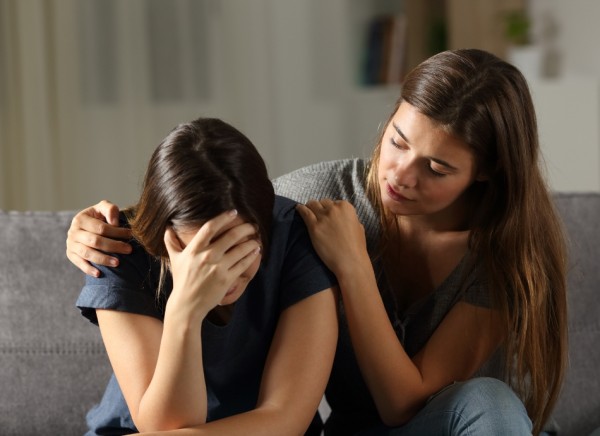Family violence
Also known as domestic violence
Key points about family violence
- Family violence includes child abuse, partner abuse and elder abuse.
- Anyone can be affected, regardless of their age, gender, sexual identity, cultural background, ability, religion, wealth, status or location.
- If you're feeling trapped, controlled, or being physically or emotionally hurt, help is available.
- If you know or suspect someone is being intimidated, controlled or hurt, find out what you can do to help. It's OK to get involved – you could save a life.
- If you have been violent or abusive towards your partner or family members and want to make a change, support is available.

Family violence (previously referred to as domestic violence) is hurting a family member or someone you're in a close personal relationship with.
Family violence can happen in many kinds of relationships
This includes violence between:
- husbands and wives
- civil union partners
- de facto (living together) partners
- people who are biological parents of the same person
- people related by blood
- people related through marriage, civil union, de facto relationships or adoption
- members of the same family/whānau or other culturally recognised family group
- flatmates or other people who live in the same house or flat
- people in a close personal relationship who don’t live together
- people in care/carer relationships, if it's also a close personal relationship.
Family violence can be hurting someone physically. It can also be hurting someone emotionally, psychologically, financially and/or sexually.
Physical abuse
- Hitting and punching.
- Biting, pushing, choking or pulling your hair.
- Making you drink or take drugs when you don't want to.
- Using or threatening to use weapons
- Strangulation or suffocation.
Psychological abuse
- Making you feel like everything you do is wrong.
- Tormenting you emotionally.
- Constantly criticising you or your friends.
- Humiliating you in front of your friends.
- Using unsafe driving to frighten you.
- Damaging property/walls/possessions to scare you.
- Making you feel isolated and alone.
- Blaming everything on you.
- Threatening to take the children away or hurt them.
- Stalking, following, checking up on you.
- Holding you against your will.
- Harming, or threatening to harm, pets to punish you.
- Stopping you from, or forcing you to, practice a faith or religion.
- Making you feel scared of what might happen next.
- Allowing or encouraging others to harm you.
- Taking your identity documents – passport, driver's licence.
- Coercing or forcing you into a civil union or marriage.
Sexual abuse
- Forcing you to have sex or do other sexual acts you don't want to do.
- Touching you in a way you don't want.
- Frequently accusing you of sleeping with other people.
- Forcing you to watch porn.
- Stealthing – non-consensual condom removal.
- Sharing compromising photos or videos (ones that might embarrass you or damage your reputation) without your consent.
Financial abuse
- Taking your money, access to money or work, or property.
- Running up debts in your name.
- Misusing power of attorney.
- Pressuring you into paying money.
Neglect
- Not providing food, clothing and warmth.
- Leaving dependants alone or with someone who is unsafe.
- Not providing comfort, attention and love.
- Not providing medical treatment.
Family violence is a crime in Aotearoa New Zealand. Find out more about the family violence act and the family violence (amendment) act.(external link)
Examples of family violence in rainbow relationships
-
stops you, or makes you feel guilty about, spending time with people who matter to you
-
threatens to tell somebody about your HIV status
-
talks or acts in a way that makes you feel bad about who you are
-
uses your incorrect pronoun or name
-
hides gender affirming equipment or medication
-
threatens to 'out' you
-
pressures you into sexual acts you don't want.
Examples of family violence if you have a disability
-
ignores you when you ask for help, or leaves you in a chair for too long
-
stops you taking medication
-
doesn't allow you to talk freely or privately
-
stops you using a mobility aid
-
controls your finances
-
doesn't support the decision you make
-
doesn't respect your needs (eg, for low light or noise)
-
touches you without your consent when helping you with your daily care needs.
Family violence affects everyone. It happens in homes, neighbourhoods and communities.
Family violence is common because of widely held beliefs and attitudes that make it seem okay. These include the view that it’s alright to use violence against women, and violence and other controlling behaviours within intimate partner and family relationships.
To reduce and prevent family violence, we all need to take ownership of the part we play in promoting healthy attitudes and beliefs. We can do this by challenging unhealthy beliefs and attitudes, safely and respectfully, when we come across them in everyday conversations – whether those conversations are in person, by text or on social media.
Communities have a significant role to play in preventing violence and making it not okay. Read more about how to prevent family violence and learn more about promoting change in your community(external link).
Whether your relationship is long term or casual, you deserve to be treated well. You also need to make sure you’re treating your partner respectfully. Take the positive relationship quiz(external link) to see how healthy your relationship is.
Family violence is not okay. You have the right to be safe. Report any family violence to the Police.
- Call the Police on 111 if you think you or someone else is in danger. If it’s not safe to speak, push 55 on a mobile (any number on a landline) to be put through to the Police.
- If it's not an immediate crisis but you want support or someone to talk to about your concerns, phone the 'It’s not OK' information line on 0800 456 450. You can also log a concern with the Police by calling 105.
- If you are at risk of family violence, you can apply to get a Protection Order from the court. Learn about applying for a protection order(external link).
The Family Violence Information Line (0800 456 450) provides self-help information and connects people to services where appropriate. It's available 7 days a week, from 9am to 11pm, with an after-hours message redirecting callers in the case of an emergency.
You can also search under 'Family Violence' in our Services Directory for support services in your area or find an organisation on the New Zealand Family Violence Clearinghouse links(external link) page.
Here are some organisations you can contact for help:
- Women’s refuge crisis line(external link) 0800 733 843, 24 hours
- Family violence information line(external link) 0800 456 450
- Shine national helpline(external link) 0508 744 633, 9am to 11pm
- Shakti(external link) for migrant and refugee women, 0800 742 584, 24 hours
- National network of stopping violence(external link) 03 391 0048
- Elder abuse(external link) Helpline 0800 32 668 65, 24 hours
- Gandhi nivas(external link) supporting men to be free from violence 0800 426 344
- Hohou te rongo kahukura – outing violence(external link) building rainbow communities free from violence
- Sensitive claims ACC(external link) 0800 735 566
Free legal help
- Community Law(external link)
- YouthLaw(external link) 0800 UTHLAW (884529)
Family violence leave
If you, or a child in your care, are affected by domestic and family violence, you can ask your employer for paid family violence leave and flexible working arrangements. Find out more about family violence leave(external link).
Pets
You might need to leave a relationship but you're worried about leaving your pets and can't take them with you. Pet refuge(external link) provides a safe place for pets from around Aotearoa New Zealand affected by domestic violence, keeping them safe while their owners escape abuse.
It’s hard to know what to do when you know – or suspect – that a friend or whānau member is living with violence. There are many actions that help. Sometimes just one action or comment can make the difference.
If you know or suspect someone is being intimidated, controlled or hurt, find out what you can do to help(external link). It's OK to get involved – you could save a life.
Keep in mind:
- Adults affected by family violence feel a lot of shame whether they are being violent or being hurt. They need to make changes in their own time when they are ready.
- Children need to be protected from violence happening in their homes – they need adults around them to keep them safe.
If you want to help someone who you suspect is violent, challenge the behaviour, not the person. Say things like:
- Can I help?
- Do you need to talk?
- It's not OK your kids are scared of you.
The sooner you reach out to someone who is being violent the sooner they can get help to change.

Image credit: Canva
If your family is scared of you, or if people tell you that your behaviour is frightening, you might need to consider making changes to the way you behave.
Admitting you need help and changing your behaviour takes courage, effort and determination but brings lifelong rewards.
There are services all over Aotearoa New Zealand that offer programmes and support for you to learn new ways of behaving.
The Family Violence Information Line (0800 456 450) provides self-help information and connects people to services where appropriate. It is available seven days a week, from 9am to 11pm, with an after-hours message redirecting callers in the case of an emergency.
You can search for the type of help you want through the Are You OK?(external link) service finder.
Other people who can help:
(E Tū Whānau, NZ, 2017)
Campaign for action on family violence(external link) Ministry of Social Development, NZ
Strangulation, choking or stopping someone from breathing(external link) Shine, NZ
Family violence it's not OK(external link)
Translated information
Key information for people experiencing family violence from Are you ok? NZ(external link)
Te reo Māori(external link), Samoan(external link), Tongan(external link), Arabic(external link), Farsi(external link), Hindi(external link), Khmer(external link), Punjabi(external link), Simplified Chinese(external link), Traditional Chinese(external link)
References
- Campaign for action on family violence(external link) Ministry for Social Development, NZ
- What is family violence?(external link) Are you ok? NZ
- I want change(external link) Are you ok? NZ
- Family violence(external link) Ministry of Justice, NZ
- Family violence leave(external link) New Zealand Government, NZ, 2022
- Takatāpui and rainbow – understanding violence in rainbow relationships(external link) Are you ok? NZ
- Disabled people – what is family violence?(external link) Are you ok? NZ
Credits: Healthify editorial team. Healthify is brought to you by Health Navigator Charitable Trust.
Reviewed by: Juanita Harrison, Clinical Psychologist and Certified Life Coach, Auckland
Last reviewed:





